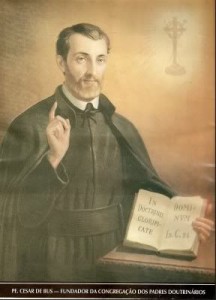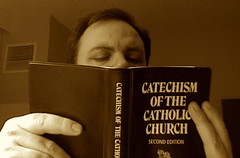 Last year I heard about a French Blessed, a modern patron of catechists, Father Cesar de Bus, beatified in 1975 by Pope Paul VI. This same pope recommended to the Church this witness for our following.
Last year I heard about a French Blessed, a modern patron of catechists, Father Cesar de Bus, beatified in 1975 by Pope Paul VI. This same pope recommended to the Church this witness for our following.
De Bus has an interest story for us to think about, and I think we in the USA ought to make the effort to allow his good name and missionary zeal flourish in our work of passing on the faith. Connecting with de Bus in an real way is crucial for teaching the faith especially to children. We ought to invoke Blessed Cesar de Bus for those involved with the work of catechesis. A friend wrote, Father Ambrose, delivered the following homily on de Bus.
“…saintly man named César de Bus, who is a splendid patron and guide for all who seek to hand on the Catholic faith. He was born in Cavillon, France, on February 3, 1544, the seventh of thirteen children. Though he had a good Jesuit education, he was a worldly young man who couldn’t decide between the career of a soldier and that of a writer. In the end, he decided for the military. It was the time of the bloody Wars of Religion in France, when it hung in the balance whether France would remain Catholic or become Protestant. And yet, despite fighting in the Catholic cause, César himself led a life of dissipation: he was known as a party boy, as a dandy, as one who wanted to make his way at the royal court in Paris. He also still had literary ambitions.
Now César’s brother was a priest, a cathedral canon with a good income. When his brother died, César succeeded in gaining the income from his late brother’s position without himself actually being a priest or doing anything in return for the income. It was an abuse that often happened in Catholic France in those days: a layman would hold a clerical position simply as a source of revenue. Just in case you don’t know, the wasteful and worldly squandering of the Church’s goods is not exactly a new problem. It was well-known and widely criticized in the 16th century, too.
But then something unexpected happened. César had come to know an illiterate but very pious servant girl named Antoinette Reveillade. This young woman had persuaded César to read to her the lives of the saints, even while Antoinette fervently and in tears begged God that death would not find César in mortal sin. He at first shrugged off her concern. Then, one night, as César was on his way to a masked ball, he passed a shrine where a light burned before the image of Our Lady. Suddenly he remembered Antoinette, and was stricken with remorse and felt an overwhelming desire to repent and amend his life. He thought, “How can I recommend myself to God while I am on the way to offend Him?” In the words of one of César’s biographers, “One tempestuous night, the All-powerful God, the King of Glory, encountered the worldly chevalier César de Bus, obstinate in sin, and conquered him.” There and then, like St. Paul on the road to Damascus, he was converted to Christ.
César resumed at last his studies for the priesthood and was ordained a priest at last in 1582 at the age of thirty-eight. He read the life of the Catholic Reformer St. Charles Borromeo and became convinced that widespread religious ignorance was the cause of many scandals and failures among French Catholics. But César didn’t just complain or wring his hands: he did something about it.
First, he converted his cousin Jean-Baptiste back to the Catholic faith. Jean-Baptiste had become a convinced Calvinist because of the impressive zeal and strictness shown by French Protestants, who so often put the Catholics to shame. After Jean-Baptiste returned to the Church, he, too, was ordained a priest. César and his cousin then dedicated the rest of their lives to the work of catechesis, founding an order for that purpose called the Fathers of Christian Doctrine and also a similar order for women. After his conversion, Blessed César directed his energies to two things: penance for his earlier life and the teaching of doctrine. And yet, it was actually an unlettered servant girl’s prayers that had led to the grace of his conversion. This reminds us that it is only the love of God and of neighbor that can inspire the teaching of sound doctrine and make it fruitful in our lives. And yet, true charity cannot be content that those whom Christ has redeemed by his Most Precious Blood should be ignorant of divine truth. Ignorance is not bliss, in religion or in anything else.
Blessed César died on 15 April 1607 and was beatified in 1975. At the beatification, Pope Paul VI (who will himself soon be beatified) had this to say about the parallels between our age and that of Blessed César:
[Our time] is a period in which the world is in crisis, as formerly, and in which most values, even the most sacred ones, are rashly questioned in the name of freedom, so that many people have no longer any point of reference, in a period in which danger comes certainly not from an excess of dogmatism but rather from the dissolution of doctrine and the nebulousness of thought… It seems to Us that an additional effort should be courageously undertaken to give the Christian people, who are waiting for it more than is thought, a solid, exact catechetical base, easy to remember. We well understand that it is difficult today to adhere to the Faith, particularly for the young, a prey to so many uncertainties. They have the right at least to know precisely the message of Revelation, which is not the fruit of research, and to be the witnesses of a Church that lives by it.
César de Bus had seen how religious divisions and social upheaval had devastated the faith of many. Amid all the fighting about religion between Catholics and Protestants—and among French Catholics, too—, there was considerable neglect of the actual practice of the faith.
Surely, with the Venerable Servant of God Paul VI, we can see the parallels with the state of the Catholic Church after the Second Vatican Council. As in the 16th century, there are the vast multitudes of Catholics, here and in Latin America, who have become Protestants because of our weakness in catechesis and evangelization. Is it any wonder that so many Catholics respond to the evangelical preachers who still have the courage to proclaim without dilution that Christ alone is the Way, the Truth, and the Life? Blessed César saw these very failings among Catholics in France four hundred years ago.
And, like that great saint, we can do something about the situation. Think of that amazing story of Blessed César’s conversion and ask his intercession for a renewed zeal for the teaching of sound doctrine in our pulpits, our schools, and our catechetical programs.
In the words of the Letter to the Hebrews, let us “lift up our drooping hands and strengthen our weak knees” (Heb 12.12), for the Lord himself is calling us to work in his vineyard.



